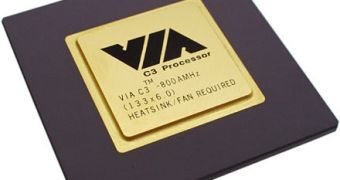Graphics specialist Nvidia is allegedly in talks with chipset and CPU manufacturer VIA about a possible acquisition. According to some sources quoted by the Taiwanese tech website Digitimes, Nvidia has already made VIA a merger offer, but they did not reach an agreement on financial grounds.
According to the same sources, Nvidia presented the x86 CPU manufacturer three possible scenarios, namely a chip manufacturing alliance, the acquisition of its processor business or even the complete merger.
Despite the fact that the two companies did not reach an agreement, Nvidia will come back with another offer, as VIA is expected to cut down on its terms. Via is currently losing both money and market share, which forced the company to shut down its chipset business earlier this year, in order to focus on the x86 CPU development. However, VIA denied the rumors and claimed that it is still focused on manufacturing x86 processors and chipsets, and currently has no plans on selling out its business.
Nvidia's intention of buying out VIA makes a lot of sense, given the current power balance on the chip market. AMD, the company's Arch-rival in the graphics processors market has its own x86 CPU business, and is currently gearing up to make an important step with the advent of its GPU-in-CPU Fusion processor. In fact, in a previous interview carried out by Softpedia, Ian McNaughton, senior product manager at AMD said that the Fusion chip is the main purpose of the ATI acquisition.
At the same time, Intel is pitching at delivering its own breed of GPU-in-CPU chip later in Nehalem's development. Intel will use its own graphics, an overclocked version of the PowerVR core. Nvidia is currently one of the biggest manufactures of graphics and chipset solutions, and the addition of a processor unit would boost things up.
VIA could be the right choice for Nvidia, given the fact that it is currently cooking the 64-bit version of the Isaiah processor, an energy-efficient chip with state-of-the-art features and flexible scalability.

 14 DAY TRIAL //
14 DAY TRIAL //